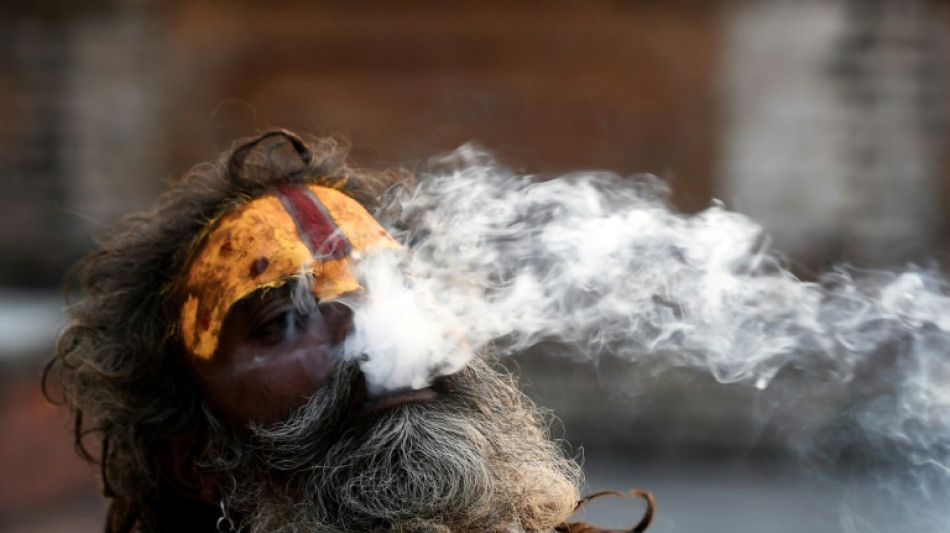
-
 Pollock shines as England eventually overpower Australia
Pollock shines as England eventually overpower Australia
-
Villarreal crush Rayo to move second, Atletico beat Sevilla

-
 Sinner crushes Zverev to reach Paris Masters final, brink of No. 1
Sinner crushes Zverev to reach Paris Masters final, brink of No. 1
-
Pollock shines as England beat Australia in Autumn opener

-
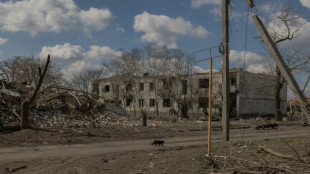 Ukraine sends special forces to embattled eastern city
Ukraine sends special forces to embattled eastern city
-
Arsenal cruise against Burnley as Man Utd held

-
 Pollock shines as England beat Australia 25-7 in Autumn Nations Series
Pollock shines as England beat Australia 25-7 in Autumn Nations Series
-
Gyokeres on target as leaders Arsenal beat Burnley

-
 Woman charged over Louvre heist tears up in court
Woman charged over Louvre heist tears up in court
-
Diomande dazzles as Leipzig go two points behind Bayern

-
 Auger-Aliassime downs Bublik to reach Paris Masters final
Auger-Aliassime downs Bublik to reach Paris Masters final
-
Villarreal crush Rayo to move second in La Liga

-
 Female suspect, 38, charged in Louvre heist: AFP
Female suspect, 38, charged in Louvre heist: AFP
-
US not sending any high-level officials to COP30

-
 India captain Kaur sees World Cup final as possible turning point
India captain Kaur sees World Cup final as possible turning point
-
'Not out of the woods': What now for Britain's ex-prince Andrew?

-
 Tens of thousands of Serbians mark first anniversary of deadly train station collapse
Tens of thousands of Serbians mark first anniversary of deadly train station collapse
-
Tanzania president wins 98% in election as opposition says hundreds killed

-
 Vieira 'no longer' manager of troubled Genoa: club
Vieira 'no longer' manager of troubled Genoa: club
-
Tanzania president wins 98% of votes after violence-marred polls

-
 South Korea hosts Xi as Chinese leader rekindles fraught ties
South Korea hosts Xi as Chinese leader rekindles fraught ties
-
England's batting exposed as New Zealand seal ODI series sweep

-
 Funk legend turned painter George Clinton opens show in Paris
Funk legend turned painter George Clinton opens show in Paris
-
Traditional mass wedding held in Nigeria to ensure prosperity

-
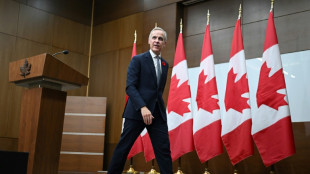 Canada PM says Xi talks 'turning point', apologises to Trump
Canada PM says Xi talks 'turning point', apologises to Trump
-
Iranian tech prodigies battle it out with robots

-
 Maldives begins 'generational ban' on smoking
Maldives begins 'generational ban' on smoking
-
Explorers seek ancient Antarctica ice in climate change study

-
 India's Iyer discharged from hospital after lacerated spleen
India's Iyer discharged from hospital after lacerated spleen
-
Serbia marks first anniversary of deadly train station collapse

-
 Latin America weathered Trump tariffs better than feared: regional bank chief
Latin America weathered Trump tariffs better than feared: regional bank chief
-
Bangladesh dockers strike over foreign takeover of key port

-
 Tanzania president wins election landslide after deadly protests
Tanzania president wins election landslide after deadly protests
-
Dodgers, Blue Jays gear up for winner-take-all World Series game seven

-
 Taiwan's new opposition leader against defence spending hike
Taiwan's new opposition leader against defence spending hike
-
Dodgers hold off Blue Jays 3-1 to force World Series game seven

-
 Crowns, beauty, fried chicken: Korean culture meets diplomacy at APEC
Crowns, beauty, fried chicken: Korean culture meets diplomacy at APEC
-
Panama wins canal expansion arbitration against Spanish company

-
 Myanmar fireworks festival goers shun politics for tradition
Myanmar fireworks festival goers shun politics for tradition
-
China to exempt some Nexperia orders from export ban

-
 Sixers suffer first loss as NBA Cup begins
Sixers suffer first loss as NBA Cup begins
-
China's Xi to meet South Korean leader, capping APEC summit
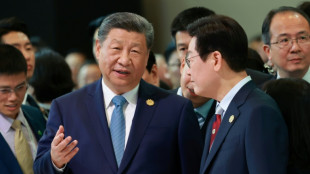
-
 Japan's Chiba leads after Skate Canada short program
Japan's Chiba leads after Skate Canada short program
-
Finland's crackdown on undocumented migrants sparks fear

-
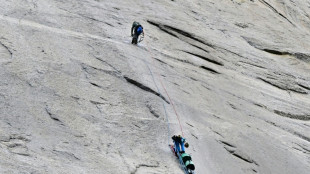 Climbers test limits at Yosemite, short-staffed by US shutdown
Climbers test limits at Yosemite, short-staffed by US shutdown
-
Gstaad gives O'Brien record 21st Breeders' Cup win

-
 After the tears, anger on Rio's blood-stained streets
After the tears, anger on Rio's blood-stained streets
-
Sinner boosts number one bid in Paris, to face Zverev in semis

-
 Springer back in Toronto lineup as Blue Jays try to close out Dodgers
Springer back in Toronto lineup as Blue Jays try to close out Dodgers
-
Nationals make Butera MLB's youngest manager since 1972


Nepal ganja campaign seeks return of Himalayan high times
Nepal's marijuana ban could soon be up in smoke, as lawmakers mull a return to the liberal drug policies that once made the Himalayan republic a popular pit stop on the overland "hippie trail".
Half a century ago, thousands of fun-seeking backpackers from around the world made their way to Kathmandu to buy potent hash strains from government-licensed stores on "Freak Street" -- a lane named for long-haired and unkempt foreign visitors.
Washington's global war on drugs, and its accompanying pressure on foreign governments, prompted the closure of the capital's dispensaries in 1973, along with a cultivation ban that forced farmers to rip up their cannabis plants.
Now, with Western countries easing their own prohibitions on marijuana, the government and legal reform campaigners say it is time to stop criminalising a potent cash crop with centuries-old ties to the country's culture and religious practices.
- Corruption and smuggling -
"It is not justifiable that a poor country like ours has to treat cannabis as a drug," Nepal's Health Minister Birodh Khatiwada told AFP.
"Our people are being punished... and our corruption increases because of smuggling as we follow decisions of developed countries that are now doing as they please."
Khatiwada sponsored Nepal's first parliamentary motion advocating an end to the ban in January 2020, and two months later a bill was put to lawmakers seeking partial legalisation.
A change in government has stalled progress since, but in December of that year Nepal backed a successful campaign to have the United Nations reclassify cannabis out of its list of the world's most harmful drugs.
Nepal's home ministry has since launched a study into the medicinal properties and export potential of marijuana that is expected to support a revived parliamentary push to end the ban.
"It is a medicine," said prominent activist Rajiv Kafle, who lives with HIV and began campaigning for legalisation after using the drug to treat his symptoms.
Kafle said ending the ban would be an "important booster" to Nepal's tourism industry, which is still reeling from the Covid pandemic, and would also benefit Nepalis suffering from chronic illnesses.
While the current law allows for medicinal cannabis, there is no established framework for therapeutic use and the government still enforces a blanket ban on consumption and trafficking.
"So many patients are using it, but they are forced to do it illegally," Kafle told AFP. "They can get caught anytime."
Enforcement of the ban is already patchy: tourists visiting Nepal's backpacker haunts are unlikely to encounter the long arm of the law for lighting up a joint in a Kathmandu back alley.
Authorities also look the other way during an annual festival held to honour the Hindu deity Shiva, the destroyer of evil, who is regularly depicted clasping a chillum pipe used to smoke cannabis.
Ganja smoke wafts around the grounds of Kathmandu's Pashupatinath Temple each year as holy men gather to celebrate and worshippers fill their own chillums with Shiva's "gift".
But elsewhere, penalties are harsh and regularly enforced. Marijuana dealers risk up to 10 years jail time and police seize and destroy thousands of cannabis plants across the country each year.
- 'Part of our culture' -
Prohibition interrupted a long tradition of cannabis cultivation in Nepal, where plants grew wild and their stems, leaves and resin were used in food, as clothing fibres or as a component of traditional Ayurvedic medicines.
"The ban destroyed an important income source in this region," a farmer in western Dang district told AFP, speaking on condition of anonymity. "It ignored how it was part of our culture and everyday life, not just... an intoxicant."
Several Western countries have ended their own bans on marijuana use in recent years, including parts of the United States, which once spearheaded the global campaign to criminalise the drug.
In California, dispensaries sell "Himalayan Gold", a strain which originated from Nepal and calls to mind the country's historic associations with weed culture.
A rejuvenated marijuana trade tailored to burgeoning export demand and cashing in on Nepal's existing "international brand value" could prove highly lucrative, said Barry Bialek, a doctor working at a cannabis research centre at Kathmandu University.
"As a cash crop it can be good locally but also in the global market," he told AFP. "It can be a leader in the world."
C.Kovalenko--BTB



